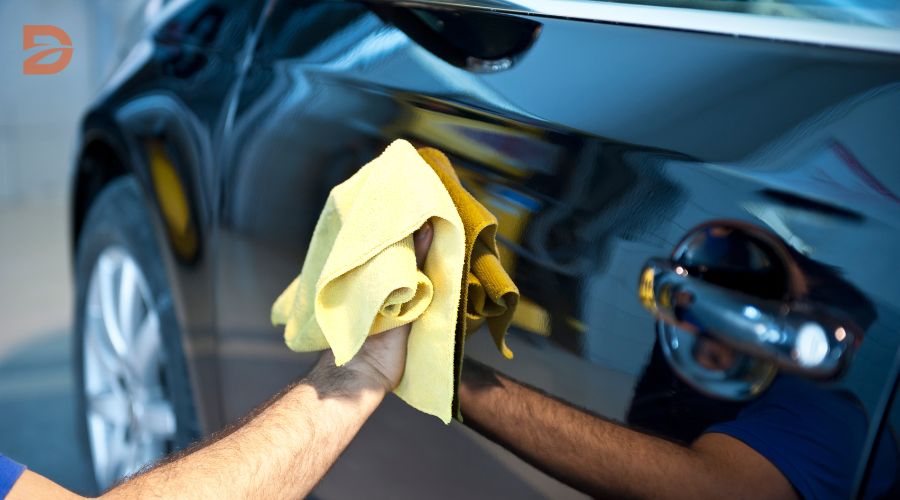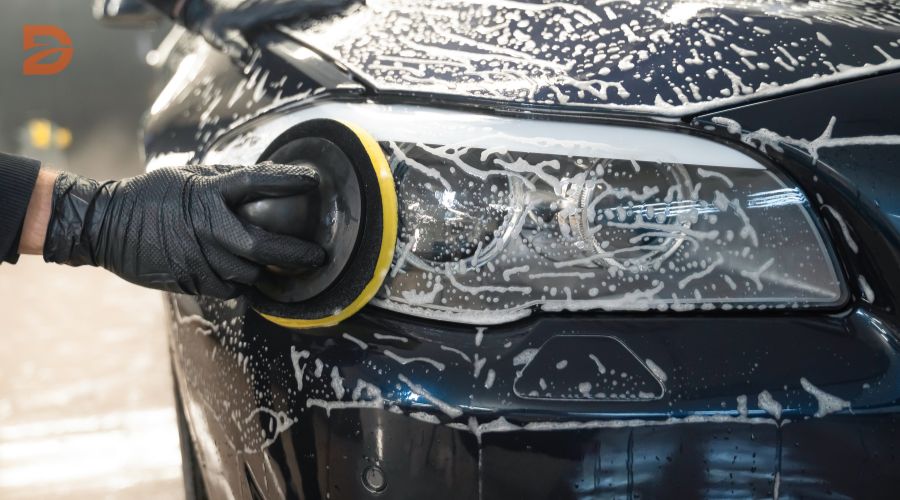Are you aware that the steps you take today can significantly impact your car’s resale value down the line? As the average length of vehicle ownership in the United States has increased to 6.5 years, it’s more important than ever to understand the factors that influence a car’s value. By making informed decisions and implementing simple maintenance practices, you can potentially maximize the returns when it’s time to sell your vehicle.
Key Takeaways:
- Certain car models and brands are known for their strong resale values due to reliability and reputation.
- Well-maintained, regularly serviced vehicles with a clean history tend to command higher prices on the used car market.
- Modifications that enhance the car’s functionality and aesthetics can boost its resale value.
- Avoiding damage and keeping the car’s interior clean and well-cared for can prevent a decrease in resale value.
- Thorough documentation, necessary repairs, and professional cleaning can positively impact a car’s presentation and perceived value.
Factors That Affect Car Resale Value
When it comes to selling your car, understanding the factors that influence its resale value can be crucial. From the make and model to the condition, mileage, modifications, and color, each aspect plays a role in determining how much you can expect to get for your vehicle.
Make and Model
The make and model of your car can have a significant impact on its resale value. Luxury vehicles and popular brands often hold their value better, while less desirable models may see a steeper decline. Analyzing market trends and research can help you determine how your specific make and model will perform in the used car market.
Condition
The overall condition of your car, including its appearance and any necessary repairs, is a major factor in determining its resale value. Vehicles in excellent condition with a clean, well-maintained interior and exterior will typically command higher prices than those with visible wear and tear or unaddressed issues.
Mileage and Age
Both the mileage and age of your vehicle will affect its resale value. Lower-mileage cars and newer models generally maintain their value better than high-mileage or older vehicles. Keeping your car’s mileage as low as possible and regularly servicing it can help preserve its resale value.
Modifications
Modifications to your car can either help or hurt its resale value. Useful upgrades, such as performance parts or technology features, may increase the appeal and value of your vehicle. However, highly customized changes or modifications that stray from the original design can often reduce its resale value.
Color
The color of your car can also influence its appeal and resale price. More common colors like black, white, and silver are often easier to sell, while less popular or bold colors may limit the pool of potential buyers and reduce the car’s resale value.
| Factor | Impact on Resale Value |
|---|---|
| Make and Model | Luxury vehicles and popular brands tend to hold their value better. Less desirable models may see a steeper decline. |
| Condition | Vehicles in excellent condition with a clean, well-maintained interior and exterior will command higher prices. |
| Mileage and Age | Lower-mileage cars and newer models generally maintain their value better than high-mileage or older vehicles. |
| Modifications | Useful upgrades may increase value, but highly customized changes can often reduce resale value. |
| Color | Common colors like black, white, and silver are often easier to sell, while less popular colors may limit the pool of potential buyers. |
Tips to Maximize Car Resale Value
Maintaining your car’s interior and exterior condition is crucial for maximizing its resale value. By following a few simple tips, you can ensure your vehicle stays in top shape and appeals to potential buyers when the time comes to sell.
Avoiding Smoking or Eating in the Car
Smoke and food odors can linger in a car’s interior, reducing its appeal and resale value. Refrain from smoking or consuming food and drinks inside the vehicle to keep it fresh and clean.
Keeping Pets Off the Upholstery
Allowing pets in the car can lead to hair, dirt, and damage to the upholstery. Protect your car’s interior by keeping pets off the seats and using covers or barriers to maintain the pristine condition of the fabrics and leather.
Being Thoughtful with Upgrades
While some car upgrades and modifications can enhance the vehicle’s appeal, it’s important to consider their impact on resale value. Avoid highly customized changes that may limit the car’s broader market appeal.
Keeping Thorough Documentation
Maintain detailed records of your car’s service history, repairs, and any modifications. This documentation can reassure potential buyers and demonstrate the vehicle’s well-maintained condition, boosting its resale value.
Making Necessary Repairs
Address any outstanding issues or minor repairs to ensure your car is in optimal condition. Proactive maintenance can help retain the vehicle’s value and make it more appealing to buyers.
Thoroughly Cleaning the Vehicle
Regular auto detailing, including interior and exterior cleaning, can make a significant difference in your car’s perceived value. A well-maintained, spotless vehicle will attract more interest from potential buyers.
Taking High-Quality Photos
When it’s time to list your car for sale, take clear, well-lit photographs that showcase the vehicle’s condition. Detailed, high-quality images can help potential buyers envision the car and its features, increasing the likelihood of a successful sale.
Proper Maintenance and Upkeep: Essential for Increasing Car Resale Value
Maintaining your car’s car maintenance, vehicle upkeep, and attending to preventative auto repairs are essential for preserving its resale value. Regular oil changes, tire rotations, and brake inspections help keep your vehicle running smoothly and extend its lifespan. By following the manufacturer’s recommended maintenance schedule, you can demonstrate to potential buyers that your car has been well-cared for, which can translate to a higher selling price.
Keeping detailed service records is crucial when it comes to maximizing your car’s resale value. Maintaining a comprehensive maintenance history shows potential buyers that you’ve been proactive in addressing any issues and performing necessary repairs. This level of transparency and attention to detail can give buyers peace of mind and increase their willingness to pay a fair price for your vehicle.
In addition to routine maintenance, investing in the overall appearance of your car can also boost its resale value. Regularly cleaning the interior and exterior, addressing minor dents or scratches, and keeping the upholstery in good condition can make a significant difference in how your car is perceived by potential buyers. By taking these simple steps, you can ensure that your car looks its best and commands a higher price when it’s time to sell.
Invest in New Tires
Investing in new tires before selling your car can be a wise decision to boost its resale value. Worn-out tires can be a major turnoff for potential buyers, who may view them as a costly repair they’ll have to make. By replacing your tires with fresh, high-quality ones, you can not only improve your car’s curb appeal but also give the impression that you’ve taken excellent care of the vehicle.
Why New Tires Matter
New tires can have a significant impact on your car’s resale value. According to industry insights, the condition of the tires can directly affect the trade-in value. Tires with worn-out tread or other visible signs of wear and tear may lead to a lower trade-in offer, as dealerships often deduct the cost of replacing the tires from the overall value. In contrast, fresh, high-quality tires can contribute to a buyer’s peace of mind and their perception of your car’s overall condition.
Cost Considerations
While the cost of new tires may seem like an additional expense, it can often be recouped through a higher selling price or trade-in value. According to our research, a local tire store quoted $500 for a set of Goodyear tires installation, while the estimated resale price increase due to like-new tires could be between $300 and $350. This means that investing in new tires can be a smart move, especially if you’re looking to maximize your car’s resale value.
It’s important to note that the impact of new tires on the final selling price may vary depending on the vehicle, its age, and the specific preferences of potential buyers. Some buyers may not necessarily value new tires but rather expect the car to be in good overall condition without any major expenses. However, for many, the presence of fresh, high-quality tires can be a selling point that can make your car more attractive and potentially lead to a higher selling price.
Keep All Your Paperwork
Maintaining and organizing all documentation related to your car is crucial for maximizing its resale value. Keeping a comprehensive service history, including receipts for repairs and maintenance, demonstrates to potential buyers that the vehicle has been well cared for. Retaining the original owner’s manual, window sticker, and other records can also add value, especially if the car becomes a collectible in the future. By keeping these documents in a safe and organized manner, you’re showing buyers that you’ve been diligent in caring for your vehicle.
The Importance of Documentation
Thorough documentation is essential for establishing the car’s vehicle history and service records. Potential buyers want to see that the car has been properly maintained and serviced throughout its lifetime. By providing a complete paper trail, you can reassure buyers and increase the perceived value of your car documentation.
What to Keep
- Original owner’s manual
- Window sticker or pricing information
- Service records and receipts for repairs and maintenance
- Accident or damage reports (if applicable)
- Vehicle registration and title documents
- Warranty information and documentation
Organizing and safeguarding these documents demonstrates your diligence as a car owner, which can significantly boost the resale value of your vehicle. By taking the time to maintain a comprehensive paper trail, you’re providing valuable information to potential buyers and increasing the overall appeal of your car.
Increase Car Resale Value
By following the tips outlined in this article, car owners can take proactive steps to increase their vehicle’s resale value. From maintaining proper upkeep and documentation to investing in necessary repairs and upgrades, these strategies can help ensure that car owners get the best possible return when it’s time to sell or trade in their vehicle.
One of the key factors that can significantly boost a car’s resale value is the vehicle’s overall condition. Regular car detailing can increase the resale value of a used vehicle by 10 to 20 percent, potentially translating to thousands of dollars in difference. Maintaining a clean and well-kept exterior, including addressing any paint imperfections, can go a long way in preserving the car’s value.
In addition to exterior care, proper maintenance and documentation are essential. Keeping detailed records of all maintenance and repairs can increase the resale value by showing potential buyers the care taken with the vehicle. Regular oil changes, tire rotations, and other scheduled maintenance tasks can help extend the car’s lifespan and preserve its resale value.
| Detailing Category | Impact on Resale Value |
|---|---|
| Outstanding | Highest potential increase in resale value |
| Clean | Moderate increase in resale value |
| Average | No significant impact on resale value |
| Rough | Potential decrease in resale value |
| Damaged | Significant decrease in resale value |
By prioritizing proper maintenance, documentation, and strategic upgrades, car owners can maximize their vehicle’s resale value when the time comes to sell or trade-in. These proactive measures can help ensure a smooth and profitable transaction, allowing car owners to get the best possible return on their investment.
Conclusion
Maximizing a car’s resale value requires a combination of careful maintenance, smart decision-making, and thoughtful presentation. By understanding the key factors that influence resale, implementing practical tips, and staying organized with documentation, car owners can position themselves to get top dollar when it’s time to sell or trade in their vehicle.
Regular maintenance, addressing minor issues, and maintaining the car’s appearance both inside and out are crucial steps in preserving its value. Additionally, strategic upgrades to key features, such as new tires or technology enhancements, can significantly boost a vehicle’s appeal and resale potential.
By following these strategies, car owners can help ensure they get the best possible return on their automotive investment. Whether it’s a well-maintained daily driver or a cherished classic, maximizing resale value can provide car owners with the financial flexibility they need when it’s time to upgrade or sell. With a little time and effort, car owners can unlock the hidden value in their vehicles and enjoy a smooth and profitable transaction.
FAQ
What is car resale value?
Car resale value refers to the amount a used car is likely to fetch on the open market in its current state. By paying attention to a car’s resale value early on, car owners can potentially maximize their returns in the long run.
What factors affect a car’s resale value?
Factors that affect car resale value include make and model, condition, mileage and age, modifications, and color. Proper maintenance, repairs, and presentation are essential for increasing a car’s resale value when it’s time to sell.
How can car owners maximize their vehicle’s resale value?
There are several steps car owners can take to maximize their vehicle’s resale value, including avoiding smoking or eating in the car, keeping pets off the upholstery, being thoughtful with upgrades, keeping thorough documentation, making necessary repairs, thoroughly cleaning the interior and exterior, and taking high-quality photos for a sales listing.
Why is regular maintenance and upkeep essential for maintaining a car’s resale value?
Regular maintenance and upkeep are essential for maintaining a car’s resale value. Addressing small issues like window regulators, trim pieces, and minor dents and scratches can prevent the car from appearing neglected, even if it’s mechanically sound.
How can investing in new tires boost a car’s resale value?
Investing in new tires before selling a car can be a wise investment to boost its resale value. Worn-out tires can be a turnoff for potential buyers, while new tires can improve the car’s curb appeal and give the impression that the owner has taken good care of the vehicle.
Why is it important to maintain and organize all paperwork related to a car?
Maintaining and organizing all paperwork related to a car is crucial for maximizing its resale value. Keeping a complete service history, including receipts for repairs and maintenance, shows potential buyers that the vehicle has been well-cared for. Additionally, retaining the original owner’s manual, window sticker, and other documentation can add value, especially if the car becomes a collectible in the future.










